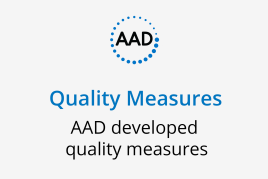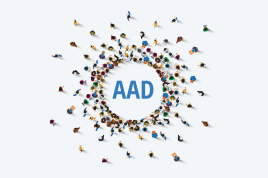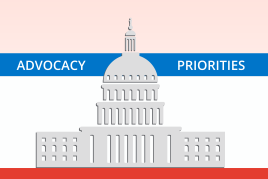Advocacy Update Jan. 28, 2025

IN THIS ISSUE / Jan. 28, 2025
Academy urges new administration to prioritize Medicare payment reform
AADA encourages CMS to ensure dermatology access to Medicare enrollees
Trump Administration pauses federal health agency communications
Jan. 31 deadline approaching to comment on USP draft buffered lidocaine monograph
Medicare Payment
Academy urges new administration to prioritize Medicare payment reform
The Academy asked the Trump Administration to work with Congress and CMS to prioritize Medicare payment reform and develop a solution to stabilize the physician payment system.
In the letter, the AADA called on the Administration (PDF) to advance legislative reforms to avert the 2025 payment cut and implement long-term fixes to the Medicare Physician Fee Schedule. These reforms include introducing positive inflationary updates and eliminating budget neutrality requirements to create a more stable and equitable payment system. Positive, inflation-adjusted updates are vital to ensuring physicians can maintain financial stability, support independent practices, and safeguard patient access to high-quality care.
Access
AADA encourages CMS to ensure dermatology access to Medicare enrollees
The AADA recently insisted that CMS ensure access for dermatology care (PDF) and treatments for nation’s seniors in 2026 Medicare Advantage and Part D coverage plans.
The AADA urged CMS, when finalizing regulations and coverage policies for the 2026 Medicare Advantage program, to consider:
Establishing network adequacy standards for dermatologic sub-specialties, ensuring access to dermatology care;
Providing relief of administrative burdens like such as prior authorization, directory attestation, and excessive medical records requests;
Restricting payer use of artificial intelligence (AI) to deny coverage or payment; and
Supporting appropriate payment based on established coding conventions and guidelines.
Quality Payment Program
Academy alarmed that Medicare wants to inappropriately group inflammatory conditions into one proposed cost and value measure
The AADA is extremely concerned that CMS wants to group inflammatory conditions into one proposed cost and/or value measure concept for 2026. The inappropriate grouping highlights flaws in CMS’s reasoning. The AADA demanded that the agency consider regrouping these neoplastic conditions.
On Jan. 24, the Academy submitted a letter raising concerns about CMS’s approach (PDF) to grouping neoplastic conditions (e.g., actinic keratosis and seborrheic keratosis) with inflammatory conditions (e.g., psoriasis and dermatitis) under the same measure concept. The Academy shared that these conditions are clinically distinct, with significant differences in treatment approaches, cost utilization, and patient populations, making such a grouping inappropriate.
The AADA opposes this grouping, as it lacks clinical relevance and would result in a flawed cost or value measure. Additionally, the AADA strongly urged CMS to address the challenges of defining a clear episode of care and accounting for the role of drug costs in the treatment of inflammatory skin conditions before moving forward.
Transition Update
Trump Administration pauses federal health agency communications
The Trump administration instructed federal health agencies to temporarily pause external communications and public engagements as the new leadership reviews its policies and procedures. This directive, in place until Feb. 1, 2025, applies to public-facing communications such as social media posts, press releases, guidance documents, grant announcements, and websites. Public speaking engagements and official correspondence with public officials are also paused unless reviewed and approved by presidential appointees.
The Academy is working closely with our contacts in the administration and federal health agencies as well as monitoring executive orders and memos to keep members informed of important updates.
Lidocaine Regulation
Jan. 31 deadline approaching to comment on USP draft buffered lidocaine monograph
AADA members have less than three days to submit comments on the Lidocaine Hydrochloride and Epinephrine Buffered Compounded Injection monograph as the deadline is this Friday, Jan. 31. It is critical that dermatologists submit their comments to USP to help ensure better time frames to prepare and administer buffered lidocaine.
The AADA has resources for members to submit comments to the United States Pharmacopeia by Jan. 31, 2025.
Provide your comments before Jan. 31.
AADA News
Donate to SkinPAC for Orlando Annual Meeting events
Want to gain access to two exclusive events in Orlando in March during the AADA Annual Meeting? Consider donating to SkinPAC.
SkinPAC will host two events to thank our 2025 donors. The first is the SkinPAC Donor Reception which will take place on March 6 from 6:30-8:00 p.m. at the pool deck of the Hyatt Regency Orlando (9801 International Drive). This event is open to all 2025 SkinPAC members who contribute $250+ and residents who contribute $25+. Please RSVP to skinpac@aad.org.
SkinPAC will also host the SkinPAC Donor Lounge, open to all 2025 members at the Silver ($1,000) level and above ($100 for residents). The lounge will be in Room W102AB at the Orlando Convention Center and will serve as a fun place to relax and connect with colleagues during the Annual Meeting, as well as enjoy breakfast, lunch, and snacks. The lounge will be open during exhibit hall hours on March 7 and 8 (8 a.m.-5 p.m.) and from 12-3 p.m. on March 9.
As of Jan. 23, SkinPAC has raised $23,474 from 31 individuals. SkinPAC helps strengthen our relationships on Capitol Hill and reinforces our grassroots and lobbying efforts.
Contribute online at www.skinpac.org or by texting SkinPAC to 71777. Email skinpac@aad.org with any questions.
The political purpose of the American Academy of Dermatology Association Political Action Committee ("SkinPAC") is to solicit and receive contributions to be used to make political campaign expenditures to those candidates for elective office, and other federal political committees, who demonstrate understanding and interest in the view and goals of the American Academy of Dermatology Association.
Contributions to SkinPAC are not deductible for federal income tax purposes. Contributions to SkinPAC must be made from your funds and may not be reimbursed. SkinPAC cannot accept contributions from corporate accounts. Any recommended contribution amount is merely a suggestion. All AADA members have the right to contribute more or less or refuse to contribute without reprisal. Federal law prohibits us from accepting contributions from foreign nationals. Federal law requires us to use our best efforts to collect and report the name, physical address, occupation, and name of the employer whose contributions exceed $200 in a calendar year.
 Find a Dermatologist
Find a Dermatologist
 Member directory
Member directory
 AAD Learning Center
AAD Learning Center
 2025 AAD Innovation Academy
2025 AAD Innovation Academy
 Need coding help?
Need coding help?
 Reduce burdens
Reduce burdens
 Clinical guidelines
Clinical guidelines
 Why use AAD measures?
Why use AAD measures?
 Latest news
Latest news
 New insights
New insights
 Physician wellness
Physician wellness
 Joining or selling a practice?
Joining or selling a practice?
 Promote the specialty
Promote the specialty
 Advocacy priorities
Advocacy priorities
